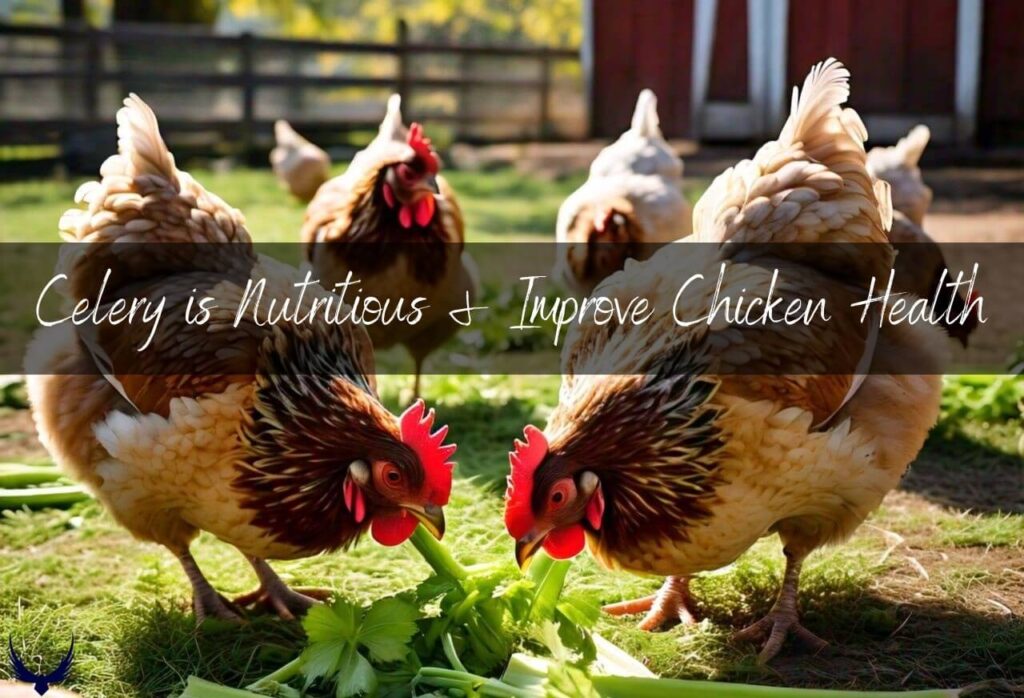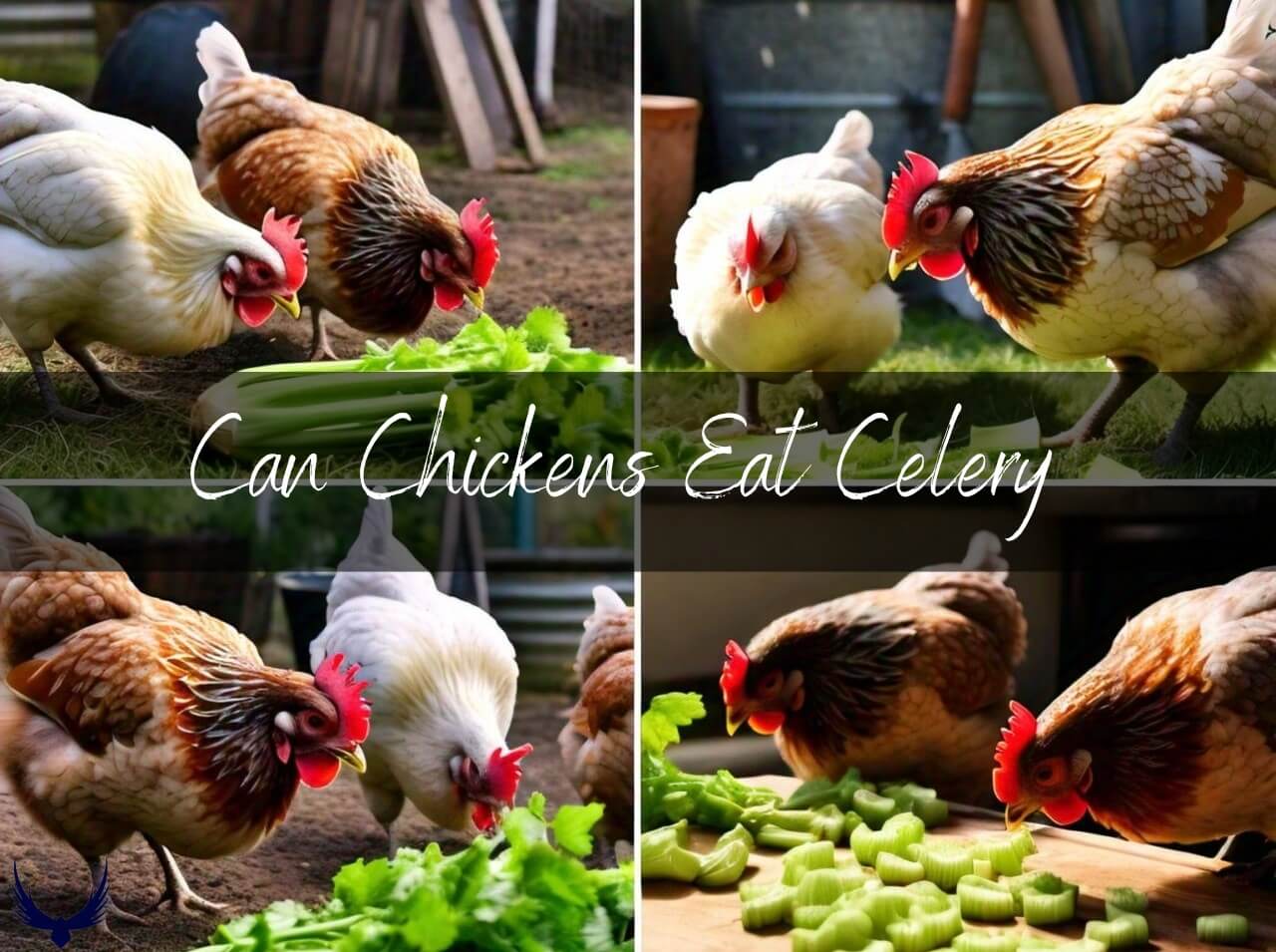As a chicken lover, you enjoy giving your feathered friends good food. You like seeing them happy when they eat. But can chickens eat celery? This crunchy green veggie might not seem like a usual choice for chickens.
Let’s see how we can give celery to chickens. Should we cook it or feed them raw? Is there a risk of them getting sick from the strings in celery? Let’s explore if this veggie can be a healthy addition to their diet!
Can Chickens Have Celery?
Chickens can eat celery. Celery is nutritious and can improve chicken health. Celery has vitamins and minerals like vitamin K, vitamin A, and vitamin C, as well as potassium. It’s important to give celery in moderation to chickens, as it should be a small part of their diet. By giving celery as a treat and not the main food, chickens can get the nutrients they need.

Celery also provides hydration and other nutrients that can improve chicken diet. Offering celery as a treat now and then can be good for their health. Remember, balance is important when feeding your chickens celery.
Nutritional Benefits of Celery for Chickens
Chicken needs a varied diet to be healthy, and adding celery can give them extra nutrients they might not get from their regular food. Celery is low in calories and has lots of water. The details of nutrients are given below:
Vitamins
Celery is full of vitamins that chickens need for their growth.
- Vitamin C: It helps chickens fight diseases, handle stress, and protect against damage from free radicals. It boosts egg production and increases the likelihood of successful hatching.
- Vitamin K: It helps with blood clotting to prevent bleeding and makes bones stronger by working with calcium.
- Vitamin B-9 (Folate): It supports cell growth, division and egg production.
Minerals
Celery is full of minerals like calcium, potassium, magnesium, manganese and zinc that help the chickens stay healthy.
- Calcium: It is important for chickens because it helps them have strong eggshells and bones.
- Potassium: It helps regulate fluid balance, muscle function, and is essential for a healthy heart.
- Magnesium: It is important for cells and bones. It works with calcium and phosphorus in chickens’ diets.
- Phosphorus: It is vital for strong bones. Chickens also require phosphorus to help calcium stick to their bones.
- Manganese: It helps with lipid and carbohydrate metabolism in the body. It is important for bone development, growth, maintaining eggshell quality, preventing perosis, and keeping chickens healthy.
Antioxidants
Celery has antioxidants like Flavonoids, Lunularin, and Bergapten that fight harmful free radicals in your body.
- Flavonoids: Flavonoids are added to chicken feed to improve the quality of meat and eggs in commercial poultry.
Fiber
Celery has 1.7g of fiber per cup, which helps with digestion and prevents harmful ammonia buildup. High levels of ammonia can harm chickens and affect human health through contaminated poultry.
Chickens have over 900 different microorganisms that need a delicate balance to stay healthy. Eating enough fiber provides these good microbes with the energy they need to break down food and keep chickens’ guts healthy.
Other Benefits of Celery for Chickens
- Celery is a low calorie vegetable with fiber that helps to reduce bad cholesterol.
- Celery has antibacterial properties that fight harmful bacteria and promote good bacteria in the body. Adding celery to their diet can help protect them.
- Celery helps chickens stay hydrated and prevent health problems like liver stones and digestive issues because it has a lot of water content. But be careful not to give chickens too much celery, as excess water can lead to issues like frostbite, especially in winter.
- Celery helps protect chicken’s liver by reducing fat buildup, which is important for the liver’s health and function.
- Celery improves a chicken’s gut health by providing nutrients that help produce enzymes for digesting food and maintaining gut health. It also helps with constipation and water retention, acting as a natural diuretic.
- Celery has lots of vitamins and minerals that strengthen the immune system and protects chickens from illnesses like colds. It also stops harm to chicken organs from oxidative stress.
How to Feed Celery to Chickens?
If you want to give your chickens celery, start with a small amount and always follow these steps:
Washing and Chopping the Celery
Rinse the celery and check it carefully. If it looks bad, don’t give it to the birds. If there are bugs, remove them before feeding the celery to the birds. Chickens can get sick if they eat things they’re not used to. Celery is tough and hard to chew, so chickens need help digesting it. Chop it up small to make it easier for them to eat.

For added variety, you can mix chopped celery with other vegetables like tomatoes, Broccoli and Jalapenos or include the celery leaves which are packed with nutrients. During hot days, you can also freeze small celery pieces in ice cubes to create a cooling treat.
You can also mix chopped celery with fruits like Kiwi, Apple, Grapes, Bananas, Strawberries, and Oranges.
Avoid Feeding Moldy and Rotten Celery
Don’t feed chickens anything that is old or rotten. If you wouldn’t eat it, don’t give it to them. Moldy fruits and veggies can make chickens sick. Be careful about what you feed them, and never give them anything moldy.
Feed in Moderation
Feed your chickens a balanced diet by giving them pellets and crumbles. Limit treats like celery to prevent them from becoming too focused on one food. Celery is nutritious but should only make up 10% of their diet. This can help ensure they get all the necessary nutrients and stay healthy.
Risks and Considerations
Celery is good for chickens, but too much can cause health problems. It’s stringy and hard for chickens to eat, can make them choke. Celery doesn’t have all the proteins and fats chickens need, so too much can mess up their nutrition.
Chicken owners should remember that a balanced diet is important for their flock’s health. It’s okay to give treats like celery sometimes, it’s more important to feed them a mix of foods that have all the nutrients they need. This will help your chickens stay healthy and avoid problems from eating too much celery.
How Much Celery Can Chickens Eat?
Celery has fiber and nutrients but don’t feed it too much to chicken, it is not good for their health. Feeding 1 cup of chopped celery to a group of 8 to 10 chickens is a good amount.
Celery has less sugar than fruits like bananas and grapes, it’s also low in protein. A diet lacking protein can reduce egg laying and hatchability. So, give celery as a supplement along with a balanced feed.
How Frequently Can Chickens Have Celery?
You can give chickens celery as a treat sometimes, but not every day. Give them celery 2–3 times a week, but make sure it’s less than 10% of their food. This keeps their diet balanced and avoids nutritional problems.
Can Chickens Eat Celery Leaves?
Yes, chickens like celery leaves more than stalks. The leaves are full of nutrients like calcium, magnesium, and manganese. They are also juicy, which chickens love. Instead of throwing away the top celery leaves, give them to your chickens.

Can Baby Chicks Eat Celery?
Baby chicks can eat finely chopped celery as an occasional treat, but only after they’re about 2 to 3 weeks old. Offer small amounts (about 1 to 2 teaspoons per 5 to 6 chicks) once or twice a week.
Remember that celery should not replace their main diet of chick starter feed, which provides the essential nutrients they need for growth. Always ensure the celery pieces are cut very small to prevent choking.
Related Article: Can Chickens Eat Mushrooms?
Can Chickens Eat Celery Stalks?
Chickens can eat celery stalks. But if you give them whole stalks, they will peck at them and don’t eat. Cut the stalks into smaller pieces so the chickens can carry them in their mouths and eat them.
Can Chickens Eat Celery Root?
Celery roots, also called Celeriac, are safe for chickens. Hang the turnip-rooted celery in their pen for the chickens to peck at. Make sure the roots are clean with no sprouts.
Is Celery Good for Chickens to Eat?
Yes, celery is good for chickens as it contains vitamins A, C, K, and minerals like potassium and folate. It’s also high in water content which helps keep chickens hydrated during hot weather.
However, celery should only be given as a treat and not as a main food source. Chickens need their regular feed for proper nutrition. The stringy texture of celery can also help keep chickens entertained as they peck and play with it.
FAQs – Can Chickens Eat Celery 2024
Can Chickens Eat Raw Celery?
Chickens can eat raw celery, but it should be cut into small pieces. If you give them a whole stalk, they won’t be able to eat it because they don’t have teeth. Celery is stringy and can cause problems if they eat too much of it. It’s best to chop it up before giving it to them.
Can Chickens Eat Cooked Celery?
When feeding chickens cooked celery, make sure to chop it into small pieces to prevent choking hazards.
Can Chickens and Ducks Eat Tomatoes?
Chickens and Ducks both birds are omnivores like peacocks and need a varied diet to be healthy. Both birds eat veggies like tomatoes, grains, seeds, and fruits. Tomatoes have vitamins and minerals that keep ducks and chicken healthy. Tomatoes are hydrating, which is good for both ducks and chickens, especially in hot weather.
Do Chickens Like Celery?
Chickens have mixed reactions to celery – some enjoy pecking at it while others may ignore it. The crunchy texture and water content can make it appealing to many chickens, but like humans each chicken has its own food preferences. You’ll need to try offering it to your flock to see if they take to it.

